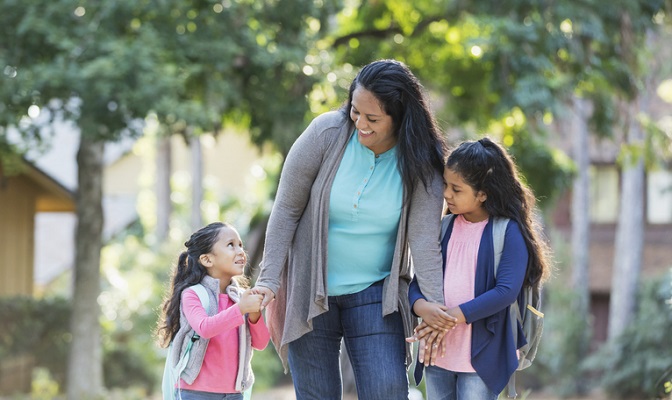Back-to-School Anxiety: What to Watch for and How to Support Kids

While the back-to-school season can bring a few jitters for most children, some experience increased anxiety and unexpected symptoms that can cause parents and caregivers to worry. And today’s students not only face the challenges of getting to know a new teacher and making new friends, but they also have to come to terms with today’s difficult and sometimes traumatic events. Children may fear gun violence, struggle to connect after COVID-19 restrictions, face increased peer pressure with social media, and so much more.
These obstacles — both the typical back-to-school anxieties and the fears in the headlines — often require coping skills that children haven’t gained yet. How can you help ease back-to-school anxiety on top of worrisome headlines? We’re here to share what’s behind that anxiety and strategies you can use to help children have a great start to the school year.
Causes and Symptoms of Back-to-School Anxiety
What Young Children May Experience
For younger kids entering school for the first time, it’s natural to experience some anxiety. School is an unfamiliar concept full of strangers, new settings and new routines. It’s also common for young children to experience some separation anxiety as they spend a significant chunk of the day away from parents or other caregivers they have bonded to.
Beyond verbalizing their worries, anxiety in these early school-goers can manifest itself physically. Young children may experience abnormal bed-wetting, stomachaches or headaches. You may also see unexpected tantrums when it comes time to head to school. You’ll also likely hear a lot of questions and a desire for repeated reassurance. Don’t worry if you hear, “Can I stay home with you?” This request to avoid change is completely normal.
What Elementary Students May Experience
Elementary school students are likely more familiar with what back-to-school time entails. These children may fear living up to class expectations, more challenging classes, extracurricular pressures and getting back into a school routine. Additionally, children at this age might have a greater awareness of the news and traumatic events in the world.
Having experienced nearly two years of COVID-19 restrictions, pivots, hybrid schedules and more as young children, some extra anxiety isn’t surprising. Kids feeling this kind of back-to-school anxiety may have difficulty sleeping, headaches, upset stomachs and bedwetting as the first day of school approaches.
What High School Students May Experience

In addition to the academic and social pressures, high school students are likely very aware of what’s happening in the world. With access to social media and the internet, teens experience the pressure to do good and look good, all the while coming to terms with the risks and dangers of the world. This can easily lead youth to experience fear and stress that they might not have encountered before.
High schoolers with anxiety may experience symptoms like unexpected behavioral changes, decreased or increased appetite, difficulty concentrating, sleep problems or withdrawal from family and friends. These new anxieties can add a complex layer for students who are being treated for another mental health challenge. In some cases, more severe anxiety and depression symptoms can be profound.
In some cases, feeling anxiety may cause a young person to exhibit challenging behaviors. While these may look like rebellion at first glance, defying authority, skipping school, vandalizing property or self-harm can also be a reaction to feelings of anxiety.
Common Anxiety Disorders for Young People
It’s not unusual for young people to exhibit common anxiety disorders as they begin to face the world’s challenges. This may include generalized anxiety disorder (GAD), separation anxiety disorder, social anxiety disorder, or obsessive-compulsive disorder, among others. If you’re concerned that your child may be facing one of these common anxiety disorders, start by consulting their primary care physician. And it’s also important to ask your child’s doctor if the anxiety could be a symptom of an underlying issue, like ADHD, for example.
If a young person needs treatment for an anxiety disorder, there are many different ways that treatment can look such as talk therapy, cognitive behavioral therapy, art therapy, or other approaches a child finds helpful for opening up. As your child speaks with a professional about their concerns, they may learn better ways to manage their anxiety and gain access to helpful strategies and resources.
How to Support Young People Facing Anxiety
- Get familiar with new things. Whether your child will be attending preschool or high school, you can begin to ease fears by helping them get acquainted with new places and new people. You could start by taking a tour of the school or simply driving by regularly. Some young children may appreciate role-playing new situations like meeting their teacher or making friends before the big day. By creating a familiarity like this, you can begin to take away the newness feeling that causes some back-to-school anxiety.
- Reduce stressors outside of school. Part of being able to face the challenges and fears of the school day is being able to relax in a comfortable, safe space afterward. Be willing to give the child space to recharge. A little respite goes a long way! Consider helping them find healthy activities to relieve stress — like joining a sports team, getting outside or channeling their energy into something creative. You can model these healthy behaviors to teach children of any age how to find comfort and peace after what may have been a stressful day.
- Acknowledge fears, and assert attendance. If your child is physically healthy, you as the parent or caregiver can be firm about their need to attend school. Feeling fear doesn’t mean school can’t be fun. Brainstorm with your student: What were some moments when they were scared at first, but ended up having a great time? Or when did something feel a little overwhelming, but turn out better than expected? Reminding them of this resilience can show kids what they’re capable of doing in the face of fear and anxiety.
- Be willing to answer questions. Current events are understandably anxiety-inducing. With headlines including school shootings, the pandemic and other violence, what can you as a caregiver do? Having a conversation to talk through worries, concerns and questions can be a good first step. Ask your child what they’ve heard and understand about the situation. Follow their lead and help them fill in gaps that may be concerning them. It’s important to note that caregivers may not always have an answer — and that’s okay. Give them space to share what they feel, and respond on their level. Reassure children that while these topics are understandably scary, schools are working to implement safety precautions.
- Lean into mental health services. If you’re continuing to see anxiety significantly impact your child as the school year goes on, seek professional help as needed. Connecting your child with the resources and education they need can be critical to helping them confront their anxiety and ultimately improve their situation. You can start by talking to a school counselor or your child’s primary physician. On our website, you’ll find eBooks, videos, blogs and more to help assess a young person’s mental wellbeing and providing tools to aid with coping.
As a parent or caregiver, you have the power to support your child as they address their anxiety and learn skills to manage it throughout their lives. You can provide a positive, uplifting environment for this emotional growth with awareness and understanding. If you feel your child may be facing a mental disorder, you may want to explore additional helpful webinars on depression, anxiety or ADHD.
About Camber Children’s Mental Health (Previously KVC Hospitals)
For 30 years, Camber Children’s Mental Health (previously KVC Hospitals) has helped thousands of kids and teens achieve mental health wellness through expert and compassionate treatment. Camber uses a patient-centered approach that works to heal the whole family unit when a child is struggling with depression, anxiety, suicidal thoughts, self-harming, the impacts of trauma, and other mental health needs. To learn more about our services including our internationally renowned expertise in trauma-informed care, visit cambermentalhealth.org or call us at 913-890-7468.






